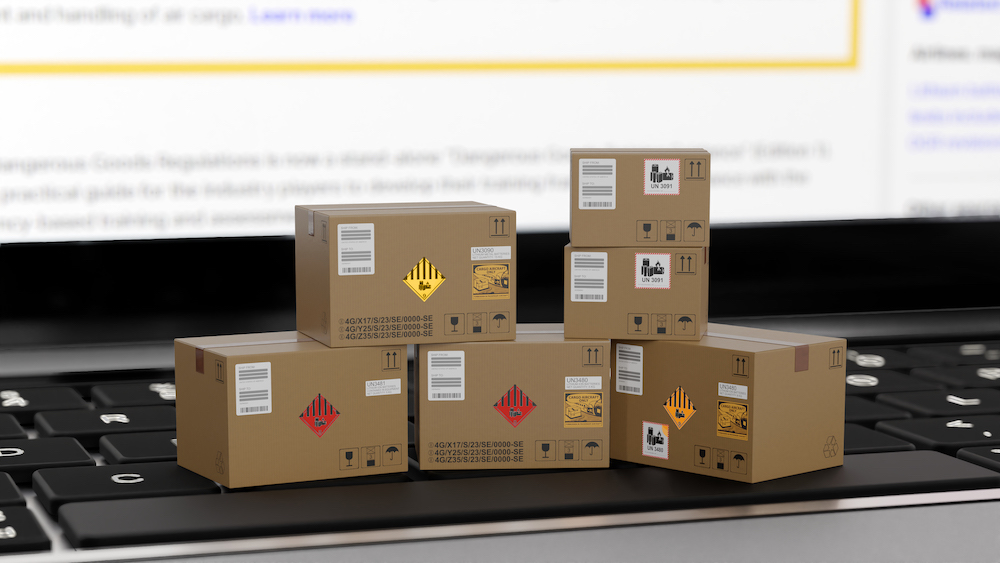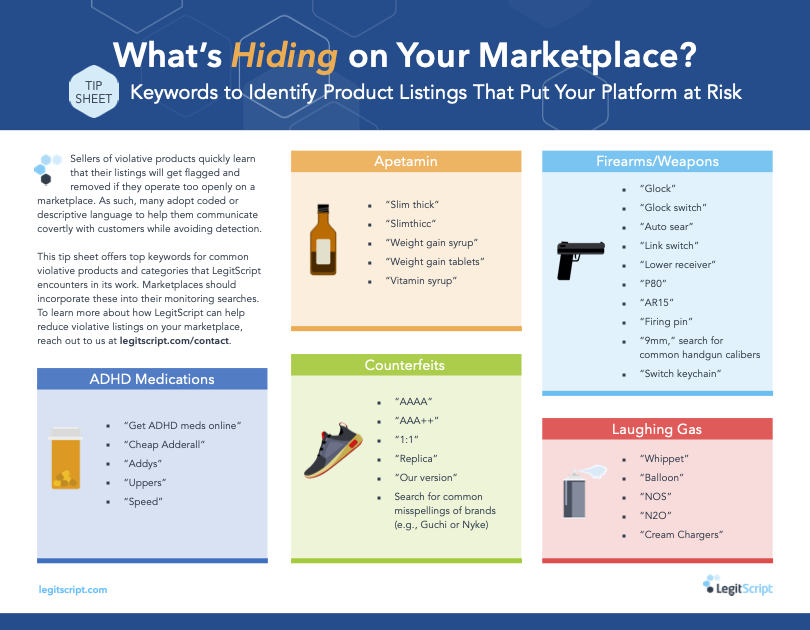You monitor seller listings on your e-commerce marketplace, but do you know what’s going on behind the scenes — or, rather, behind the screens?
Illegal and brand-damaging activity isn’t always easy to spot, and the risk only compounds as your platform scales. In this post, we explore violative activity that is happening covertly on a seller’s storefront or off platform, and explain the importance of having comprehensive visibility of seller activity beyond the listings on your marketplace. We then invite you to meet the LegitScript team at the upcoming Marketplace Risk Management Conference.
High-risk Products Often Hide in Plain Sight
We often encourage marketplaces to look at bad actors like any other small business owner. They act rationally to help grow their business — meaning they look for opportunities to market their products and search for ways to easily process payments online. Sometimes that means searching for platforms with poor enforcement measures where they can transact for long periods before getting caught. Other times it means selling violative products on major platforms in ways that evade detection.
Examples of Hidden High-risk Products
Illicit Drugs
Drugs can be sold illegally in many ways. Most commonly, LegitScript sees one or more of these issues:
- prescription drugs sold without a prescription
- drugs sold in jurisdictions in which they are not approved
- sellers who are unlicensed to sell drugs
Most commonly on marketplaces we see problematic listings for popular drugs such as Ozempic for weight loss or drugs to treat erectile dysfunction. These may be legitimate drugs that are being sold without a prescription, unapproved generic versions, or counterfeit versions of the brand name drug. It’s important to know where a seller is sourcing their drugs and what license they have to conduct sales.
Counterfeits
Among the most frequently counterfeited products are luxury accessories such as Gucci and Prada purses; sporting goods such as Nike and Adidas shoes; toys from Disney and DreamWorks; and popular electronics such as Apple Airpods.
LegitScript often sees descriptions of counterfeits using coded language, such as “1:1” and “AAAA,” which are meant to denote the quality of the fake. Additionally, counterfeit sellers are increasingly engaging in “buy this, get that” schemes in which they list an innocuous item that customers buy to receive a counterfeit product.
Problematic Supplements
Supplements are among the most complex products to review because of the sheer number of ingredients. Often a problematic supplement contains active pharmaceutical ingredients (APIs), which are impermissible in supplements. Sometimes APIs are listed on supplement labels but are difficult to spot unless you know what to look out for. Other times they are undeclared or tainted, posing an additional risk to consumers who are unwittingly consuming a potentially harmful substance.
Weapons Parts
While it may be easy to spot a fully assembled firearm, the advent of ghost guns and gun kits has increased the demand for weapons parts. These products may run afoul of card brand rules or your terms and conditions, which is why sellers often try to sell them discreetly.
To the untrained eye, gun parts can look like simple machine parts, and they are sometimes miscategorized as innocuous products such as washing machine repair parts.
Behavior Off-Platform Is Just as Important as What’s Being Sold On-Platform
Violative sellers are increasingly wise to the fact that marketplaces monitor listings, which is why they increasingly turn to off-platform resources to conduct problematic behavior — typically social media, online forums, or their own websites.
The content on these third-party platforms may be poorly regulated, allowing problematic sellers to market more freely while directing traffic to their listings on your marketplace. This poses reputational risk to your platform but is often difficult to find and track.
The Three Most Common Problems We Encounter With Off-platform Behavior
Problematic Marketing
We most commonly see problematic marketing off-platform with supplements.
A supplement cannot be marketed with express or implied claims to cure, mitigate, prevent, or treat a disease, or affect the structure or function of the body without having adequate substantiation.
Example: A seller offering Vitamin C on your platform might make impermissible health claims on their social media accounts that their product cures colds or prevents arthritis. This can draw regulatory scrutiny from the FDA and/or FTC.
There are other types of problematic claims, such as claiming a product was made in the US when it was not, or claiming that a celebrity has endorsed a product when he or she has not. These can also draw regulatory scrutiny or private legal action.
Transaction Laundering
Also called a “buy this, get that” scheme, this type of counterfeit fraud relies heavily on outside marketing. Fraudsters will list seemingly innocuous items on their seller page, but then market their counterfeit goods off-platform, typically on social media and sometimes through complicit influencers. They direct customers to their page and instruct them to order the innocuous product, when in reality they will receive the counterfeit product.
Example: A seller may list a simple black purse on your platform but what is actually being sold is a fake Gucci handbag.
Scams
Scams can take many forms, including nondelivery schemes in which a customer buys a product that is never delivered. Off platform, a seller may do or say things that trick customers into going to the seller’s listing on your platform.
Example: A seller may claim to have a 75% off sale to drive traffic to a listing when it is not true. Or, a seller may pretend to be a reseller of a popular brand when in fact they are selling counterfeit products or off-brand generics.
A Seller’s History Tells You Who They Are
Problematic sellers are nothing if not persistent. Once an account is terminated, they usually attempt to re-emerge with a new profile and new contact information. Historical data points are crucial in identifying and removing repeat offenders.
How LegitScript Identifies Reoffenders
Platform Migration
LegitScript helps monitor products, ads, and content for some of the world’s largest internet platforms. This gives us broad, unparalleled insight into seller activity across the internet. Sellers who get kicked off one marketplace will likely attempt to join another. Sellers may also have attempted to advertise on a search engine or social media platform that LegitScript monitors. Often we will already have data on a problematic seller who enters your marketplace, allowing us to more quickly scrutinize them and stop problematic behavior.
Networks
The worst offenders don’t operate in isolation — they’re part of large criminal networks attempting to infiltrate your marketplace through many profiles at once. LegitScript maintains one of the world’s largest databases of criminal networks operating online. We collect billions of data points such as name, phone number, email address, domain name, DNS data, merchant ID, and more. OneView, our next-generation merchant and seller intelligence platform, securely unites information like this from across the internet. This enables us to not only identify and stop one problematic seller but to use that data to connect them to other currently unidentified problematic sellers on your platform.
Reduce Your Risk of Violative Products While Growing Your Business
Are you an e-commerce marketplace looking to scale your business while mitigating your risk? LegitScript Marketplace Monitoring relies on more than 15 years of work with the world’s leading payment companies, search engines, social media companies, and e-commerce marketplaces to provide you with the largest database of violative, high-risk, and problematic products spanning the commercial internet. Contact us to learn more or meet the LegitScript team at the Marketplace Risk Management Conference from May 14 to 16 in Las Vegas to explore ways to grow your business, reduce risk, and safeguard your brand with confidence.





